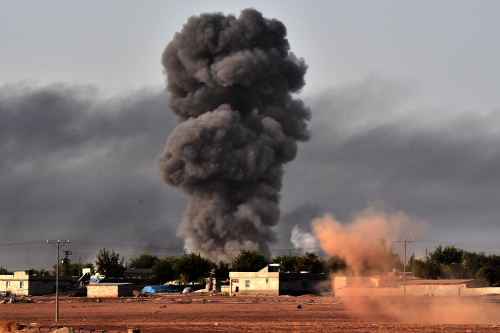 |
|
AIRSTRIKES LAUNCHED: Smoke rises from the Syrian town of Ain al-Arab, known as Kobane by the Kurds, after a strike from the U.S.-led coalition as seen from the Turkish-Syrian border in the southeastern village of Mursitpinar, Sanliurfa Province, on October 13 (XINHUA/AFP) |

The Islamic State (IS) militant group has shown its extremely brutal face to the world in its attacks and occupation of many cities and towns in Iraq and Syria in the past months. The unstoppable offensives of the IS have directly threatened the strategic interests of the United States in the Middle East.
Despite a slow reaction at first, the United States finally announced the launch of airstrikes against the IS on August 8 and President Barack Obama outlined a comprehensive strategy to combat IS militants on September 10. Up to now, however, the anti-IS actions have not yielded the expected results.
The rise of the IS is not an accidental or isolated phenomenon. The Iraqi Government failed to implement effective governance after the United States withdrew troops from the turbulent country at the end of 2011, creating a large security vacuum. In addition, its three-year civil war has made Syria a haven for Islamist extremists. The IS exploited the chaos in the region and grew rapidly. It has now become the primary terrorism threat since the notorious Al Qaeda's leader Osama bin Laden was hunted down and killed by a U.S. task force in Pakistan in 2011.
The IS has claimed that it was formerly the Iraqi division of Al Qaeda, also known as Al Qaeda in Iraq (AQI). Despite their defeat by U.S. troops, it recruited followers from all over the world secretly and prepared for resurgence. After Syria fell into civil war, AQI expanded into Syria and fought as a rebel militant group against the regime of Syrian President Bashar al-Assad. AQI occupied many places and developed a strong and experienced army.
In April 2013, AQI's head Abu Bakr al-Baghdadi announced the formation of the Islamic State of Iraq and the Levant, or the Islamic State in Iraq and al-Sham.
In June, al-Baghdadi announced the establishment of a caliphate, of which he was named caliph, to be known as Caliph Ibrahim, and the Islamic State of Iraq and the Levant was renamed the Islamic State.
The IS has become a strong military group with over 10,000 militants. Most of these militants are the veterans of battles in Iraq and Syria and have rich experience in launching terrorist attacks and fighting in guerilla warfare.
Al-Baghdadi, around 40 years old, is adept at military command. Under his command, the IS has adopted extreme and horrific methods to reach its goals, making it a far for fearsome group than Al Qaeda. In addition to terrorist attacks such as car bombings and abductions, they eliminate and persecute followers of other religions and sects by any means necessary, massacring captives of war and frightening those who dare to oppose and resist. These tactics have helped the IS occupy large areas in Iraq and Syria.
More importantly, al-Baghdadi's army is backed with sufficient funds from a variety of revenue sources in their occupied lands, gained from activities such as by imposing protection money schemes on stores and merchants. For example, the total protection money collected by IS militants in Mosul, capital city of north Iraq's Nineveh Governorate, reportedly reaches as high as $8 million per month.
Since 2012, the IS has engaged in selling oil and smuggling historic relics in its occupied area in Syria. To make quick money, IS militants also conduct abductions and bank robberies. Donations from a number of Sunni merchants comprise another important source of IS funds.
IS militants robbed $425 million from the central bank of Mosul and obtained over 400,000 pieces of arms and ammunition that belonged to Iraqi security forces after a battle last June, The Guardian reported on June 25.
The IS has become the world's richest terrorist organization. According to an Iraqi official, the organization possessed as much as $875 million in capital and assets before it controlled Mosul. After robbing local banks and military bases, the total assets of the IS may have increased to $2 billion. With such economic strength, not only can the IS enlarge its army in Syria and Iraq, but it can also provide funds for other terrorist groups, expanding its influence in the world.
| 